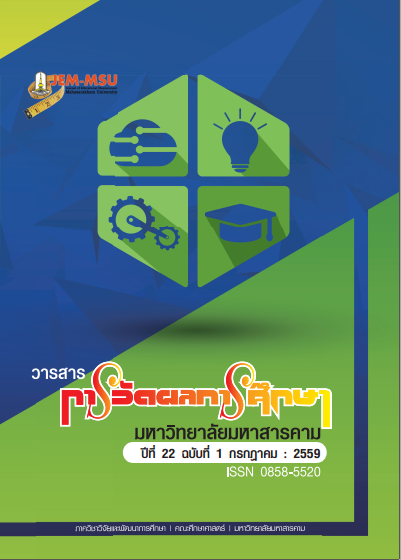Development of Promote Reading Habit Model for Early Childhood by Parent’s Involvement
Main Article Content
Abstract
The objectives of this research were to 1) study and survey fundamental data 2) construct
model 3) study effective model 4) to evaluation and revising of promote reading habit
model for early childhood by parent’s involvement. The samples consisted of 10 early
childhood parents’ at Wapipathum Kindergarten School under Educational Service Area
Office 2, who voluntary to join the study. They are ready to join develop promoting reading
habit by parent’s involvement model for 10 weeks. The instruments were 1) the handbook
of promote reading habit model for early childhood by parent’s involvement. 2) the indepth interview for parents to ask about the best way to support their children’s reading
habit. 3) the conversation recording focus group of the parents 4) the in-depth interview for
experts to give promoting reading habit by parent’s involvement 5) rating scale for checking
reading habit 6) the unstructured interview for ask parent’s satisfied to promote reading
habit model. The results found that : 1) Parents are important models for reading family.
Because children like to imitate adults, especially person whom kids loved and familiar. To
encourage children have reading habit must be cultivated from an early age by participation
from all sectors. In addition, base-on the important theory ; Maslow`s Theory, The Expects
Vroom Theory, Social Learning Theory, Mirror Neuron Theory, Motivation Theory and Reinforce
Theory. 2) The prototype model composed of six elements ; background and significance,
principles and theory of model, objectives of model, steps for providing of promote reading
habit, role of person involve, and Evaluating Success. There were 3 steps for parents to
provide promote reading habit activities ; step H ( Harmony) step U (Utility) step G (Grow). 2)
The children were on average higher levels of reading habit from the start, trend to be
higher was check at the week 1,4,7,10. Furthermore, they had showed the reading habit in
frequently level. And parents were satisfied to use this reading habit model. 3) the completely
form had revised by the experts.
Article Details
The content and information contained in the published article in the Journal of Educational Measurement Mahasarakham University represent the opinions and responsibilities of the authors directly. The editorial board of the journal is not necessarily in agreement with or responsible for any of the content.
The articles, data, content, images, etc. that have been published in the Journal of Educational Measurement Mahasarakham University are copyrighted by the journal. If any individual or organization wishes to reproduce or perform any actions involving the entirety or any part of the content, they must obtain written permission from the Journal of Educational Measurement Mahasarakham University.


